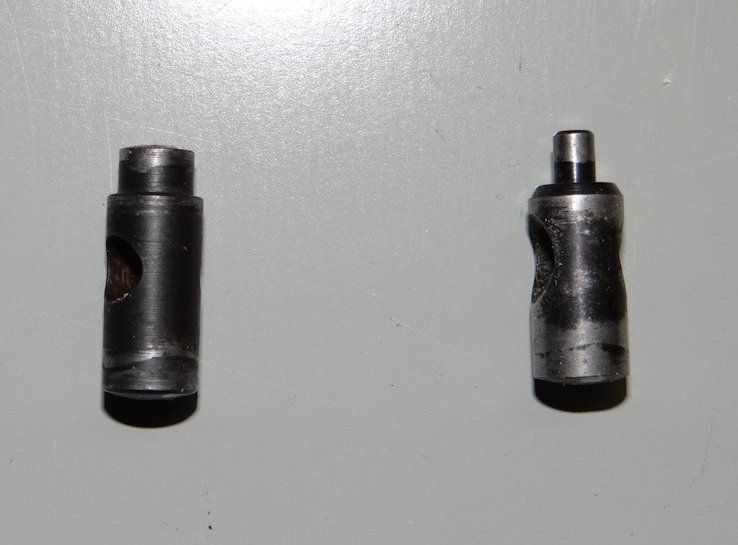Page 1 of 1
Omark bolt head retaining pins
Posted: Sun Jul 19, 2015 6:42 pm
by Chopper
Just thought it a good idea to warn NEW SHOOTERS, with Omark rifles , to check, or have a gunsmith check on this old problem that they may know nothing about, some old Omarks are still being resarected, many New Shooters may not know of this danger, Chop.
Re: Omark bolt head retaining pins
Posted: Fri Aug 26, 2016 4:08 pm
by John23
Dry firing omarks is a fast track to breaking the bolt head retaining pin also.
Discovered this when making my rem 2 ounce trigger.
Re: Omark bolt head retaining pins
Posted: Fri Aug 26, 2016 5:24 pm
by Cutanything
How does you tell what pin is what . There always the discussion but never any info to follow
Re: Omark bolt head retaining pins
Posted: Fri Aug 26, 2016 5:38 pm
by John23
I think I have both here .
I will measure them soon
Re: Omark bolt head retaining pins
Posted: Thu Sep 01, 2016 4:36 am
by northdude
they are a pretty good rifle considering their age and there isnt much info around on them
Re: Omark bolt head retaining pins
Posted: Fri Sep 02, 2016 8:32 am
by Bart

New pin on the left, old pin on right.
The old pin measures at 0.1215" and the new pin at 0.2175".
The rule from NRAA for Target Rifle shooters to change to the heavier pin came many years ago, so for people looking at purchasing an Omark hopefully it's been done. Although it's not much of a task to change it as generally most State Association stores should have them.
Re: Omark bolt head retaining pins
Posted: Fri Sep 02, 2016 8:47 am
by Barry Davies
There is a third pin.
The very first Omarks ( cannot remember how many ) had a pin that had no protrusion ( smaller diameter ) at all. These were the ones that caused the problem.
If the pin broke, and they did regularly,( mostly brought about by dry firing,) when the bolt was removed the piece of the pin located in the hole in the bolt tube fell out leaving nothing to secure the bolt head to the bolt tube. Result of this was that when the bolt was turned down during loading the bolt head did not turn so the bolt was not locked in. Result --disaster.
Even the larger pin that is now fitted does sometimes break,, but now the part of the pin with the smaller diameter is located and therefore still turns the bolt head when loading.
The design may have been a convenient way of adjusting headspace ( by changing the bolt head ) but was definitely not a safe way of doing it.
Re: Omark bolt head retaining pins
Posted: Fri Sep 02, 2016 11:12 am
by Bart
that's very interesting Barry, I didn't know that, I had only ever seen the two.
From the serial number on my first Omark I thought it must fairly old and had the smaller pin originally, this now lives as a .223 F-Class rifle. Also have a Dale rifle which basically has an Omark bolt in .308 F-Class. Both get regularly checked as both have had even the new pin changed when they start to develop cracks near where the firing pin passes through, and in fact I have seen instances of these actually break in half.
Like they say it was worth getting out of bed today to learn something new

cheers, Bart
Re: Omark bolt head retaining pins
Posted: Fri Sep 02, 2016 11:46 am
by johnk
Barry Davies wrote:The very first Omarks ( cannot remember how many ) had a pin that had no protrusion ( smaller diameter ) at all. These were the ones that caused the problem.
Barry,
When I was club captain, one of the old timers turned up with his Sportco with the coned pin end & the dimple inside the bolt. Needless to say, we demanded he get it upgraded immediately.
John
Re: Omark bolt head retaining pins
Posted: Fri Sep 02, 2016 12:14 pm
by Barry Davies
Yes, the very first Omarks had a pin with no protrusion with which to locate into the bolt tube. There was a hole there , in the bolt tube but this was for gas release.
After a couple of disasters they extended the pin to pass thru the small gas release hole in the bolt tube. This of course necessitated drilling another gas hole adjacent to the one the the pin then used.
That did not really solve the problem as the extended part of the pin, being too small in diameter, was subject to breaking off , hence the redesign to current standards.
